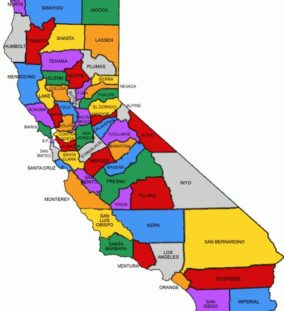57% of the voters of California adopted Proposition 64 on November 8, 2016. (See Vote Results for California 2016, pages 74-76.) Recent legislation, Assembly Bill 1356, sponsored by Assembly member Phil Ting would have mandated that local jurisdictions in which the voters adopted Proposition 64 (The Adult Use of Marijuana Act – AUMA) by a majority vote must license a limited number of retail medical cannabis businesses.
Supporters pointed out that over 76% of cities ban medical cannabis storefronts, as do nearly 69% of counties and increasing the availability of cannabis commercial activity through retail licenses would increase availability and access for medicinal cannabis. Detractors considered this an improper erosion of local control of cannabis permit regulation. Under Proposition 64, it was determined that the bill needed a 2/3 vote for adoption before it could be presented to the Senate. (See AB 1356 Local Cannabis Licenses California Assembly Analysis.) On May 30, 2019, as the bill was scheduled for a third reading, Assembly Member Ting moved the bill to inactive status. (See the California Cannabis Law Legislative Update for more info about this and other California cannabis bills.)
As a result, California cannabis businesses remain subject to strict local control. The State of California is organized into 58 Counties. In turn, the Counties are divided between unincorporated areas and incorporated Cities. There are 482 incorporated Cities. The Counties are responsible for regulation in the unincorporated areas.
Almost 70% of the Counties in California voted in favor of Proposition 64 (see Vote Results for California 2016, pages 74-76). However, of the largest counties by population, cannabis businesses remain banned. Of the five largest Counties in California, by population, representing over 50% of the population of the State, only Riverside County has established a licensing procedure for commercial cannabis.
Los Angeles County, the largest County in California by population with over 10 million people maintains a ban on all cannabis businesses. (See California County Populations.) Los Angeles County represents approximately 25% of the population of the State of California. The voters of Los Angeles County adopted Proposition 64 by nearly a 20% margin (see Vote Results for California 2016, pages 74-76), yet Los Angeles County has banned all cannabis businesses.
San Diego County, with a population of over 3.3 million, maintains a ban on commercial cannabis businesses. (See San Diego County Cannabis Regulations.) The voters of San Diego County adopted Proposition 64 by over a 10% margin. (See Vote Results for California 2016, pages 74-76.)
Orange County, with a population of over 3.1 million, maintains a ban on commercial cannabis businesses. (See Cannabis Regulations Orange County.) The voters of Orange County adopted Proposition 64 by a 4% margin. (See Vote Results for California 2016, pages 74-76.)
San Bernardino County, with a population of over 2.1 million, maintains a ban on commercial cannabis businesses. (See Cannabis Regulations San Bernardino County.) The voters of San Bernardino County adopted Proposition 64 by a 5% margin. (See Vote Results for California 2016, pages 74-76.)
In comparison, as early as May 1, 2018, Santa Barbara County adopted cannabis business regulations to permit cultivation, manufacturing, retail, distribution, microbusiness and testing labs. (See Cannabis Regulations Santa Barbara County.) Outdoor cultivation was specifically prohibited in the coastal zone except for those medical cannabis cultivation sites subject to amortization which expired on June 15, 2019. (See Medical Marijuana Regulations Santa Barbara County.) Cannabis businesses must obtain land use approval as well. The voters of Santa Barbara County adopted Proposition 64 by greater than a 20% margin. (See Vote Results for California 2016, pages 74-76.)
On April 9, 2019, the Santa Barbara County Board of Supervisors amended the law regarding retail cannabis businesses. (See Cannabis Licensing Santa Barbara County.) Retail storefront cannabis businesses will be limited to one per each of the six defined community plan areas and two in the non-community planned area. Applicants for retail storefront cannabis businesses must submit a Pre-Qualification Application between July 1, 2019 and August 16, 2019 with no fee. The Pre-Qualification Application is not available yet. On August 26, 2019, a list of the Pre-Qualified Applicants will be published and a random drawing from the Pre-Qualified Applicants will take place on September 3, 2019. (See Cannabis Licenses Retail Storefront Santa Barbara County.)
Also, Monterey County adopted commercial cannabis regulations for all businesses as early as December 5, 2017, with an operative date of December 13, 2016. The adopted ordinance prohibited outdoor cannabis cultivation and limited indoor cannabis cultivation to greenhouses or industrial building structures that had been permitted or legally established prior to January 1, 2016. (See Cannabis Regulations Monterey County.)
However, on June 18, 2019, Monterey County will consider an Outdoor Cannabis Cultivation Pilot Program. The proposed laws will provide outdoor cannabis cultivation opportunities for both the inland and coastal areas of Monterey County, specifically, the Big Sur Land Use Plan area, Carmel Valley Master Plan area, and Cachagua Planning areas. (See Cannabis Cultivation Monterey County Staff Report.)
Other California Counties have adopted some level of a regulated cannabis market. Notably, Alameda County established its cannabis regulations in 2017. And Humboldt County began issuing medical cannabis permits as early as 2016. However, the fact remains that less than one third of California Counties have entered the regulated cannabis marketplace.
Contact us by phone or email to learn more about California cannabis law including state, county or city cannabis licensing and cannabis regulations, cannabis regulatory compliance, and cannabis litigation.

